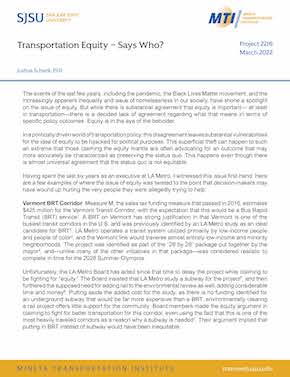- 408-924-7560
- mineta-institute@sjsu.edu
- Donate
Transportation Equity – Says Who?
The events of the last few years, including the pandemic, the Black Lives Matter movement, and the increasingly apparent inequality and issue of homelessness in our society, have shone a spotlight on the issue of equity. But while there is substantial agreement that equity is important— at least in transportation—there is a decided lack of agreement regarding what that means in terms of specific policy outcomes. Equity is in the eye of the beholder. In a politically driven world of transportation policy, this disagreement leaves substantial vulnerabilities for the idea of equity to be hijacked for political purposes. This superficial theft can happen to such an extreme that those claiming the equity mantle are often advocating for an outcome that may more accurately be characterized as preserving the status quo. This happens even though there is almost universal agreement that the status quo is not equitable.
This perspective describes some examples of where the issue of equity was twisted to the point that decision-makers may have wound up hurting the very people they were allegedly trying to help. They are (1) Vermont BRT Corridor, (2) Traffic Reduction Study (congestion pricing), and (3) Bus Operations.
JOSHUA SCHANK
Joshua Schank is a Managing Principal at InfraStrategies, a transportation and financial advisory firm, where he leads a practice focused on innovation, strategic planning, and technology. He is also a Research Associate at the Mineta Transportation Institute and a Senior Fellow in the Institute for Transportation Studies at the University of California, Los Angeles (UCLA).
Prior to joining InfraStrategies and UCLA, Dr. Schank was the first-ever Chief Innovation Officer (CIO) of the Los Angeles County Metropolitan Transportation Authority (Metro). Dr. Schank joined Metro in 2015 to establish the agency’s Office of Extraordinary Innovation (OEI), which is responsible for fostering innovations that improve mobility, equity and environmental outcomes across LA County. Dr. Schank led an office that shapes Metro’s high-level strategic vision, serving as a liaison to the academic community, designing, piloting and implementing innovative programs and policies, and engaging entrepreneurs and businesses to develop public-private-partnerships. Dr. Schank helped create and lead numerous transformative Metro projects including the Vision 2028 Strategic Plan, Metro Micro, Mobility on Demand, Metro’s Traffic Reduction Study, Better Bus, two Pre-Development Agreements for the Sepulveda Transit Corridor, a Public-Private-Partnership for the West Santa Ana Branch, and an aerial tram from Union Station to Dodger Stadium.
Dr. Schank previously served as President and CEO of the Eno Center for Transportation, a leading national transportation policy think-tank based in Washington, D.C. Prior to that he led the National Transportation Policy Project at the Bipartisan Policy Center and has worked as a consultant for Parsons Brinkerhoff (now WSP) and ICF International. Dr. Schank served as Transportation Policy Advisor to Senator Hillary Clinton (D-NY) during the authorization of SAFETEA-LU and is the co-author of All Roads Lead to Congress: The $300 Billion Fight Over Highway Funding. Dr. Schank holds a PhD in Urban Planning from Columbia University, and a Master of City Planning from the Massachusetts Institute of Technology. He began his career working on behalf of the riders of the Metropolitan Transportation Authority in New York City and has never lost that spirit. He lives in Los Angeles with his wife and two sons.
-
Contact Us
San José State University One Washington Square, San Jose, CA 95192 Phone: 408-924-7560 Email: mineta-institute@sjsu.edu






